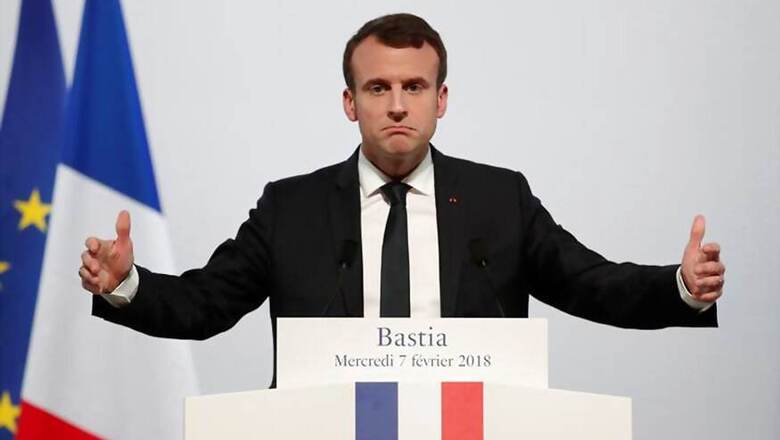
views
Paris: French President Emmanuel Macron on Sunday showcased European military cooperation in a Bastille Day parade but the glittering event was tarnished by violent clashes between police and protesters.
Key EU leaders, including German Chancellor Angela Merkel and Dutch Prime Minister Mark Rutte, joined Macron in Paris to watch the annual parade that included representatives of nine other European armies in a show of unity.
But the celebrations of France's national day were tarnished by clashes that subsequently erupted between protesters and police that recalled violence seen at the peak of the "yellow vest" protest movement earlier this year.
Police fired tear gas to clear protesters from the Champs-Elysees. Protesters tore down security barriers and set fire to rubbish bins and portable toilets, AFP correspondents said.
The earlier parade itself had gone without a hitch. Some 4,300 members of the armed forces marched down the avenue's famed cobblestones in a tradition that dates back to the aftermath of World War I.
But standing in an open-top command car alongside France's chief of staff General Francois Lecointre, Macron was met with some jeers and whistles from supporters of the yellow vest movement.
Two prominent members of the movement, Jerome Rodrigues and Maxime Nicolle, were both detained by the police, sources told AFP. Even before the clashes erupted, Paris authorities said 152 people had been detained.
A futuristic highlight of the parade came when French inventor and entrepreneur Franky Zapata showed off his futuristic flyboard, soaring above the Champs Elysees and the assembled leaders.
"The army is transforming: it is modernising for our soldiers, our sovereignty and our independence," Macron told France 2 television in brief remarks.
Closer European defence cooperation has been one of Macron's key foreign policy aims and the president shows no sign of wavering despite growing political turbulence in Germany and Britain's looming exit from the European Union.
At the 2017 parade, Macron's guest of honour was the newly inaugurated President Donald Trump as the young French leader sought to form a bond with his US counterpart.
But since then ties between Trump and Macron have soured over the US pullouts from the Paris climate accord and the Iran nuclear deal, as well as France's new law for a tax on digital giants, most of them US companies.
"President Trump has been an excellent ambassador for a Europe of defence," Armed Forces Minister Florence Parly told the Parisien newspaper Sunday, pointing to "questions, even thinly veiled threats he made towards Europe or on the durability of American commitment".
Macron, who pushed the idea of the European Intervention Initiative (EI2) to undertake missions outside of existing structures like NATO, insisted on the importance of European defence cooperation.
"Never, since the end of World War II has Europe been so important," Macron, who after coming to power in 2017 controversially dispensed with the president's traditional July 14 television interview, said in a written statement.
Merkel told reporters after the event that the parade was a "great gesture for a European defence policy" and Germany was "honoured" to have taken part.
In a sign of France's ambition to be a leading modern military power under Macron, the president Saturday announced the creation of a national space force command that will eventually be part of the air force.
Among the foreign airpower taking part in flybys were two British Chinook helicopters, a symbol of British-French defence cooperation even as Brexit looms.
Britain has deployed three of the aircraft and 100 personnel for France's operation in the African Sahel region.
Outgoing British Prime Minister Theresa May had been expected to attend, but Britain was instead represented by senior cabinet minister David Lidington, the Elysee said.
















Comments
0 comment